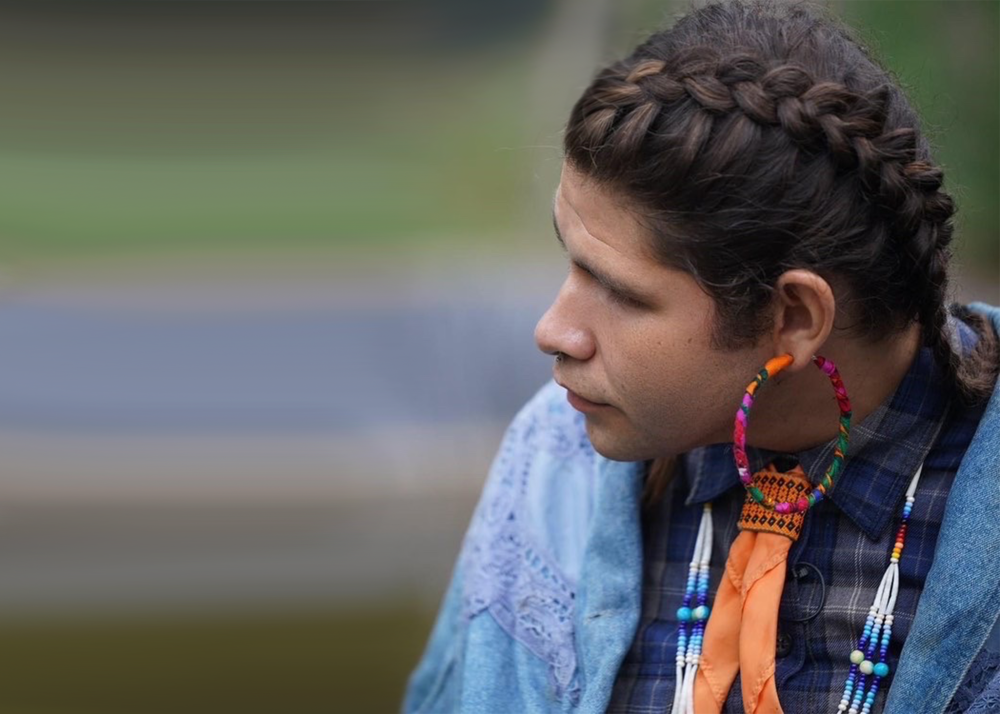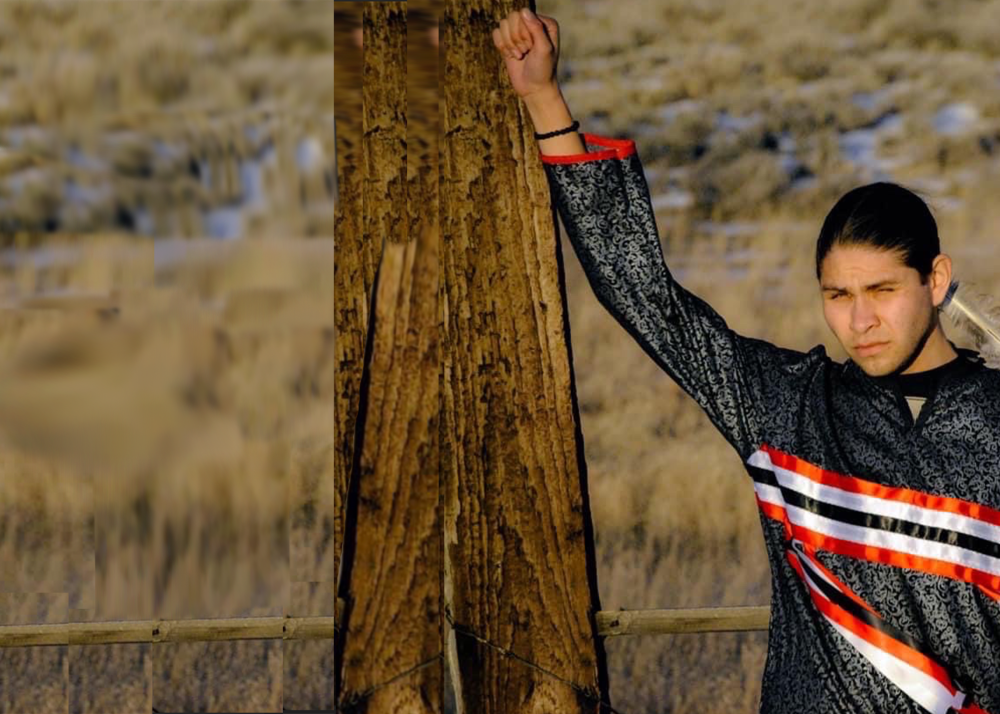“We're all like threads in a blanket”: Resisting environmental racism in oil and gas country

Big Wind wears their hair down looking straight ahead
Northern Arapaho activist criticizes extractive culture
“I come from a state that's the second largest net energy producer per capita in the U.S.,” said Big Wind, a Two Spirit member of the Northern Arapaho Tribe from the Wind River Reservation, amid dozens of oil and gas fields in what’s now called central Wyoming. The effects of rampant fossil fuel extraction on their community are clear and grave. They grew up at Beaver Creek housing where oil and gas companies have been pouring industrial runoff into the reservation’s creek. This eventually becomes the Big Wind River. Additionally, Big Wind's mother's house is near an old uranium processing facility, that now processes sulfur in sulfuric acid, and the tailings have made the groundwater un-drinkable due to radioactivity.
And yet, “when you look on the north side of the Wind River, you see mansions, lawns, golf courses—all signs of a white settlement town. And they’re not exposed to the same environmental conditions that we are,” they said.
Big Wind’s activism is devoted to resisting these injustices and the culture underlying them. This work has taken on special urgency since 2016, during Trump’s rise to the presidency. That was when they joined the front lines of the Standing Rock resistance movement against the Dakota Access Pipeline. The experience taught them the effectiveness of direct action as a tactic: “At the end of the day, the only thing that was stopping the construction was people chaining themselves to machines, people locking down to equipment, and crawling into pipes.”
Those lessons remain relevant every day as Big Wind works for their community. “We're not relying on these larger systems to save us, but taking our power back into our own hands,” they said. “We're continuing that fight of resistance against colonialism[.]”

Big wind wears their hair down and speaks to a crowd using a microphone
Resistance to fossil fuel domination means fighting disinformation, too
Oil and gas extraction found its foothold in the Northern Arapaho economy through a compounding series of events and realities stemming all the way back to colonization and the U.S. government’s forced removal of Native peoples from their land to reservations. These decisions were made long before Big Wind was born, and most people in their tribe had no say in them. Those steps and their consequences were fueled by environmental racism (the intersection of environmental injustices, poverty and race).
The oil and gas industry’s dominant presence in Wyoming extends to controlling knowledge, too. Big Wind recalls learning in their environmental science class as a teen that oil and gas were ever-producing, similar to water. These campaigns were funded to “make sure that they were not only deceiving the public, but mucking the waters so that it is less clear what is fact and what is false and what is theory,” said Big Wind. It’s the same strategy used by Big Tobacco.
Combating such disinformation has always been at the center of Big Wind’s activism. So has resistance to what they see as a dominant U.S. culture based on extraction— whether it’s companies extracting labor from their workers or extracting resources like fossil fuels from the ground. They noted this now-dominant culture is a relatively recent invention, brought to North America by settler colonialism. “A lot of these systems rely on essentially us for them to keep going. And a lot of these are ideas that were brought here—they're foreign concepts to this land,” Big Wind said.
“Indigenous people have been saying for a long time that we're having a spiritual crisis here on Mother Earth,” they said.
“The dominant society has forgotten who we are. We're animals. We need to reconnect with what it means to be in tandem with nature and live in that rhythm of reciprocity.”

Big Wind wears their hair in braids and looks to the left
Using privilege for good and giving something back
To be sure, Big Wind’s activism goes well beyond criticizing the culture at large. They point to policy specifics like parts of the Paris climate agreement that call for a market to trade carbon offsets. Many Indigenous leaders fear such a market would become a new avenue for exploiting resources and Indigenous homelands. Indigenous peoples around the world are demanding a human rights centered approach to the use of Indigenous land. Big Wind makes the same demands of the Biden administration here in the U.S.
Big Wind had a front-row seat for discussions about these issues at COP27, the United Nations global climate summit, which took place in Egypt in November 2022. They know their background has played an important role in getting to be in the room at such key moments. "I have a white grandfather, so I am light complected and I have inherited some of those privileges,” they said. “That allows me to be in a lot of spaces where people think that maybe I will just talk about the status quo.”
Big Wind’s invitation for others with privilege, including white activists, is to follow the leadership example of those most affected by environmental threats. It all comes back to direct action and plugging in to efforts that seek to ensure the health and well-being of all people. Some of the groups whose work Big Wind recommends supporting on that front are Greenpeace Action Camps, the NDN Collective, the BlackOUT Collective and the Ruckus Society.
Personally, they hope they’re laying a foundation for future generations to skip over many of the struggles they have faced in advocacy. And they offer this advice: Find your people.
“Don't spend your whole time trying to convince people that [an issue is] real. If you know something's real, find people who are like-minded individuals and start building trust with them.”
In the work of resisting extractive culture, those connections, and those individual people, are vital. “We're all like threads in a blanket, and the blanket isn't complete unless every single thread is there,” they said.

Big Wind raises their fist in the air while standing outdoors
Big Wind’s story is part of a collection in “5 Stories: Resistance in the era of fossil fuels and climate change” where we talk to community members organizing, rallying and fighting back against the various stages of the fossil fuel lifecycle, from the point of oil and gas extraction to the climate extremes it creates.
